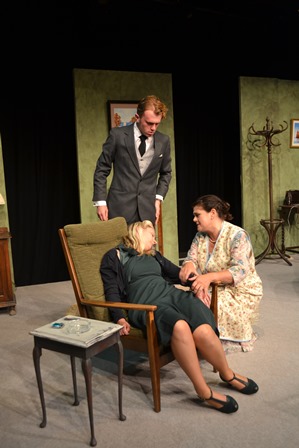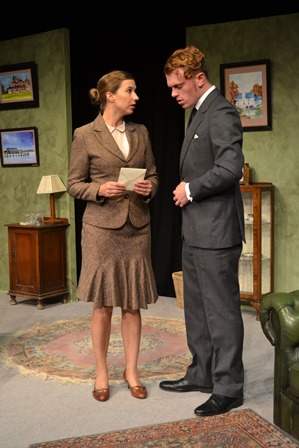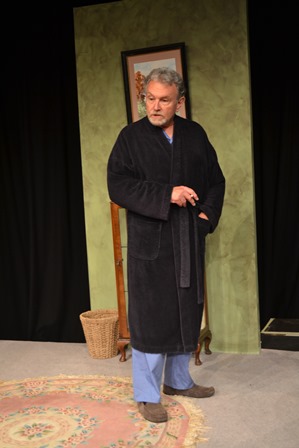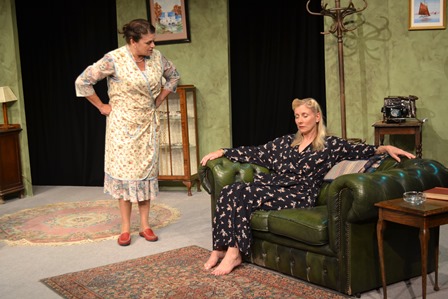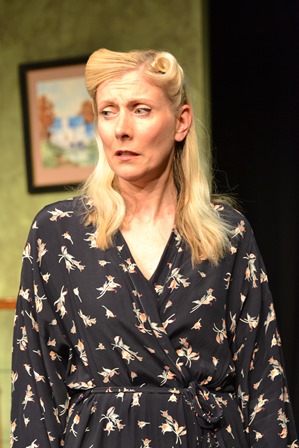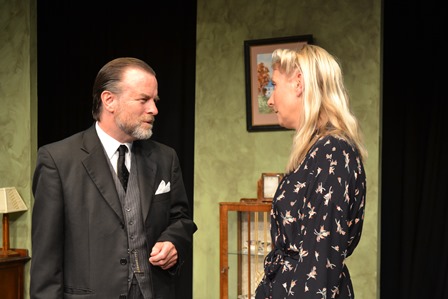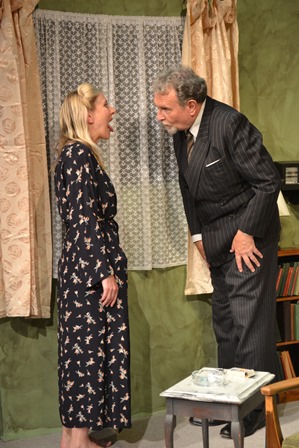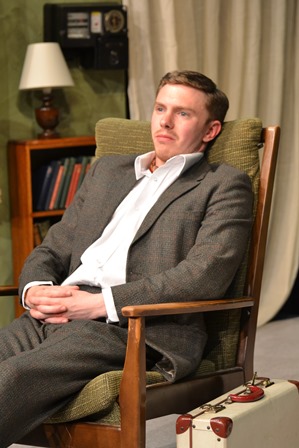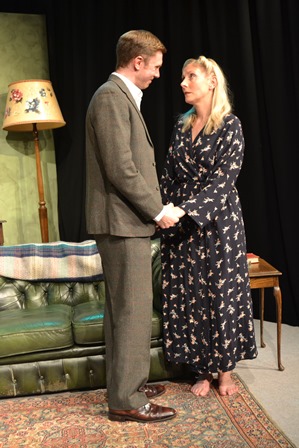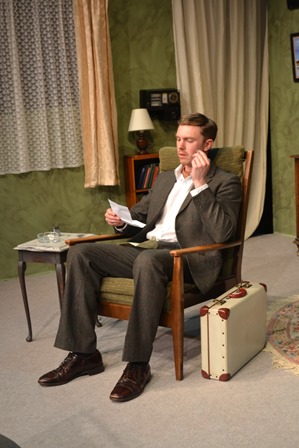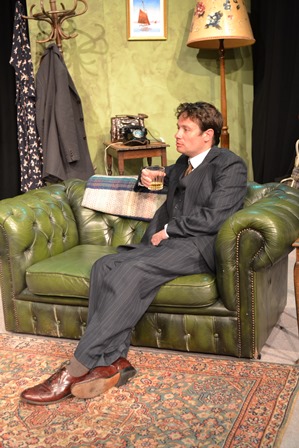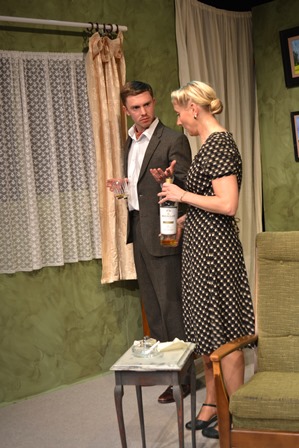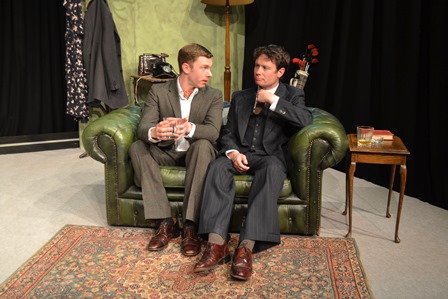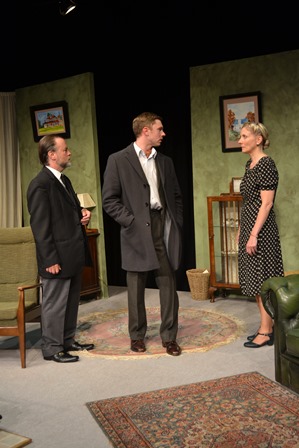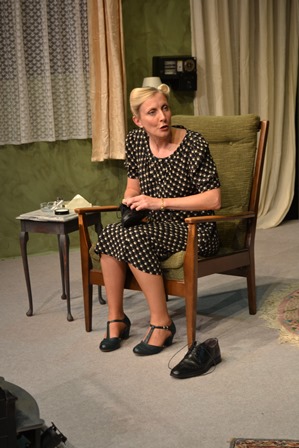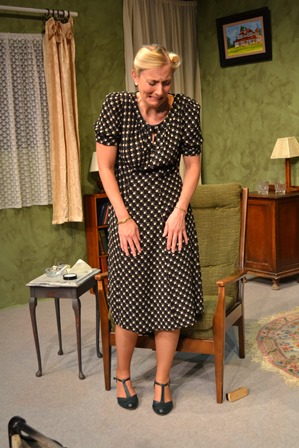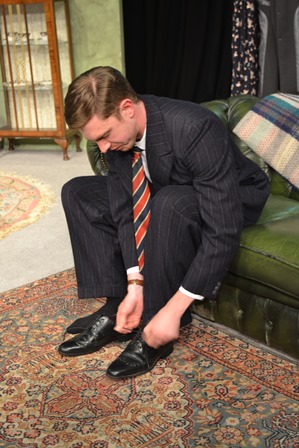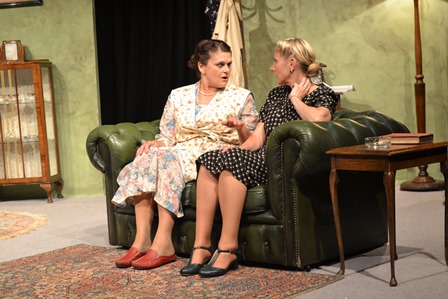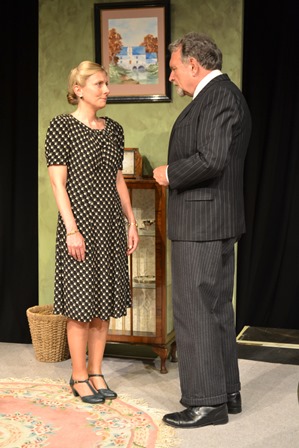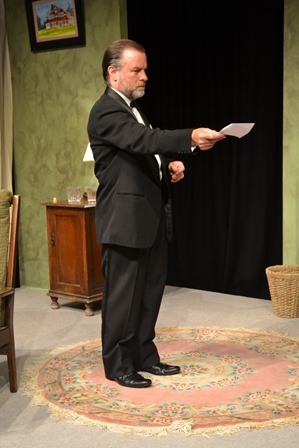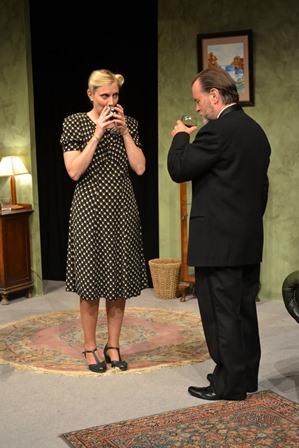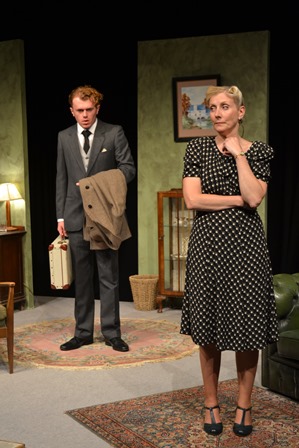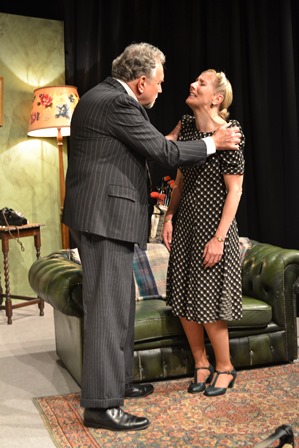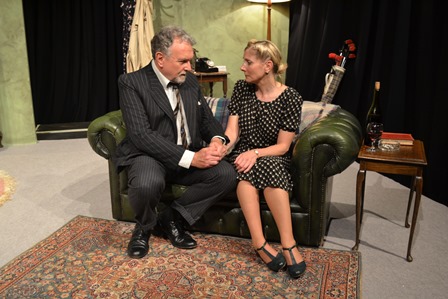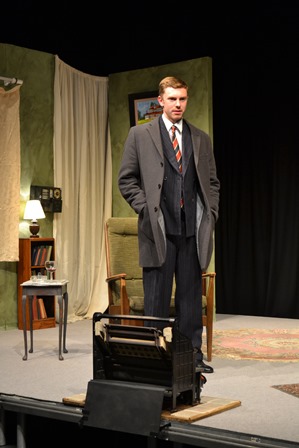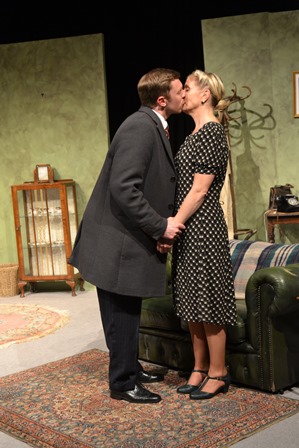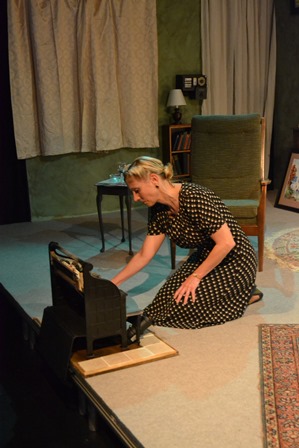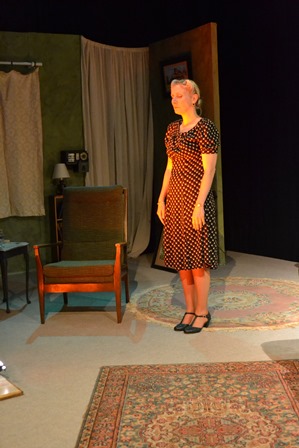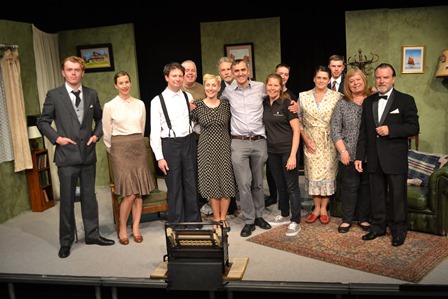AuthorTerence Rattigan
Terence Rattigan
The following notes are courtesy of THE TERENCE RATTIGAN SOCIETY.
The Terence Rattigan Society was founded in 2011, one of many events that year celebrating the centenary of the birth of the playwright widely recognised as perhaps Britains greatest Twentieth Century dramatist – Terence Rattigan. The Society exists to promote, study, explore, but above all, enjoy Rattigan's work.
Terence Mervyn Rattigan (June 10th 1911 – November 30th, 1977) was born in London, the son of the troubled marriage of a British diplomat and an Edwardian beauty. His passion for the theatre was ignited early when, aged six, he was taken to a performance of Cinderella. He began writing plays while still at school and enjoyed his first success in 1933 while at Trinity College, Oxford, when a play, written with a fellow undergraduate, was produced in London. A serious comedy depicting the loose lives and loves of a group of Oxford undergraduates, First Episode caused a minor scandal and was briefly transferred to the West End. Emboldened by this early taste of success, Rattigan left Oxford without taking a degree to embark on a career as a playwright. His father, although disappointed by his son's decision, agreed to pay him a small allowance to live at home and write plays for the next two years on condition that if, after two years, he had not succeeded as a playwright he would accept whatever job his father could find for him.
In the next two years Rattigan wrote six plays, but in vain – none was produced. With the two years up, Rattigan took up a post, found for him by his father, as a junior member of the team of hack screen-writers employed by Warner Brothers at Teddington Studios.
Rattigan's fortunes changed dramatically in November 1936 when a previously rejected comedy, French Without Tears, about students studying at a crammers in France, was put on as a cheap stopgap at the Criterion Theatre. It became an unexpected smash hit, running for over 1,000 performances and turning its author and young, little known cast – which included Rex Harrison, Roland Culver and Trevor Howard – into stars. This sudden change in fortune triggered what Rattigan later described as a nervous breakdown. During the next six years he completed only one full length play – After the Dance (1939), a powerful drama about failure, loss of ideals and unequal love. It received good reviews but, owing to the outbreak of World War Two, closed after just 60 performances.
Advised by a psychiatrist to enlist for active service, Rattigan joined the R.A.F. as an Air Gunner/Wireless Operator and flew missions with Coastal Command. This experience ushered in the most successful and productive period of his career. In just twelve years he produced ten plays, including Flare Path (1942), While the Sun Shines (1943) – which ran for over 1,000 performances –The Winslow Boy (1946), The Browning Version (1948), The Deep Blue Sea (1952) and Separate Tables (1954), plus screenplays for more than a dozen films.
However, the arrival of a new, younger generation of actors and writers in the 1950s – the success of Samuel Becket's Waiting For Godot, the first visit to London of Bertolt Brecht's Berliner Ensemble and, above all, the opening of John Osborne's Look Back In Anger in May 1956 – made Rattigan and his contemporaries appear old fashioned. This impression was heightened by Rattigan himself who wrote articles and gave ill-advised press interviews belittling the new theatrical generation and their work. Out of favour with the critics, Rattigan seemed to lose heart.
Deeply discouraged, Rattigan devoted much of the rest of his life to writing highly paid film scripts. Nevertheless, during this final period of his career he did produce three of his finest plays – Man and Boy (1963), In Praise of Love (1973) and Cause Celebre (1977).
Today Rattigan is widely regarded as the English Chekhov. His plays, while firmly rooted in the times in which they were written, remain as true and emotionally engaging as at the time of their composition. Their characters remain as real and their problems as deeply moving, the plays' themes and the issues of fundamental principle and morality with which they deal as relevant, and the comedies as hilariously funny as ever.
Membership of The Terence Rattigan Society offers members a regular magazine with articles by leading playwrights, biographers and critics, theatre listings, news and views. There are theatre visits at discount prices and trips to places associated with Rattigan – his birthplace, his home at Albany, his schools, etc. plus exhibitions, master-classes and a range of other events associated with Rattigan. But perhaps the greatest benefit of membership is the opportunity to meet like-minded people who share your enthusiasm for the work and the man.
DO JOIN US, Contact: Diana Scotney the Membership Secretary
DIANA SCOTNEY, on 01803 368418. e-mail discotney@gmail.com or go to www.theterencerattigansociety.co.uk
The Deep Blue Sea is an extraordinary play. However it becomes all the more poignant when you realise how it came to be written. Terence Rattigan was gay, a fact well known to his acquaintances but concealed from his public. Rattigan was in Liverpool on 2nd March 1949 where his latest play, Adventure Story, was on tour. He was devastated to receive a note that a Kenneth Morgan, a young actor and former boyfriend, had died. Morgan had argued with his new lover and ended up gassing himself in a run-down boarding house, the body being found by a fellow tenant. That night Rattigan announced that his next play would 'open with the body discovered dead in front of the gas fire'.
Rattigan took three years to write The Deep Blue Sea, longer than any of his other plays. A number of the plot elements are lifted directly from the events surrounding Morgan's death. It has even been suggested that Collyer, Hester's estranged husband, is veiled representation of Rattigan himself. He later said it was the hardest of his plays to write.
It was rumoured that Rattigan first wrote about a homosexual relationship and then rewrote the play around Hester. There is no evidence that he did this. Rattigan was a commercial playwright and is unlikely to have written a play that could never be performed. With all plays having to be approved by the Lord Chamberlain, a law that was not repealed until 1968, a play about homosexuality would never has been allowed. However, with his personal insight into illicit love, he was able to create a complex and nuanced portrait of a desperate woman of the like previously not seen in British Theatre.
A run-down tenement flat in North-West London. A single day in 1951. Hester Collyer has left her wealthy husband, a man she can't love the way she wants, to live with an ex-RAF pilot, a man who can't love her the way she needs. Left emotionally stranded, she can't see a way forward and going back is unbearable. She's stuck between the devil and the deep blue sea. As the day unravels, some desperate decisions need to be made.
Dont miss this opportunity to see Terence Rattigan's exquisitely crafted masterpiece about the inequality of desire. A portrait of need, loneliness and long-repressed passion which burns with a brutal sense of loss and longing. A deeply moving love story hidden behind the fragile veneer of post-war civility with, at its heart, one of the greatest female roles in 20th century theatre.
top of page

This play was staged at Havant Arts Centre, East Street Havant - Bench Theatre's home since 1977.
| Hester Collyer | Leigh Cunningham |
| Mrs Elton | Megan Green |
| Philip Welch | Archie McKeown |
| Ann Welch | Phillippa Thorne |
| Mr Miller | David Penrose |
| William Collyer | Simon Walton |
| Freddie Page | Ben Tanner |
| Jackie Jackson | Jeff Bone |
Crew
| Director | Andrew Caple |
| Producer | Sally Hartley |
| Stage Manager | Julie Woods |
| Assistant Stage Manager | Lewis Champney |
| Lighting Design | Andrew Caple |
| Lighting Operation | Alan Ward |
| Sound Design | Jacquie Penrose |
| Sound Operation | Marion Ward |
| Brochure Artwork | Andrew Caple |
| Handbill Design | Dan Finch |
| Programme | Derek Callam |
| Set Design | Pete Woodward |
| Front of House | Gina Farmer |
| Photography | Sharman Callam |
Director's Notes
When I joined the Bench I knew nothing about acting, or directing, or plays. However, with the Bench's philosophy that everyone can have a go, I started reading through the Plays section in Havant Library looking for inspiration. One really struck me, The Deep Blue Sea by a Terence Rattigan. I found the situation of the lead character and the impact they had on all those around them incredibly moving. I thought this is the play for me. Even I could direct this. However the Bench Membership thought differently, wisely judging that this would be a stretch to far for my lack of experience. That was 1993.
A lot has happened since then. In 1993, Terence Rattigan was still very much out of favour, his 'well made' middle class plays considered out-of-date, superseded by the late 50's generation of 'Angry Young Men'. Now, fortunately, his star is back in the ascendant. He is increasingly recognised as one of greatest writers in post War Britain and his plays masterpieces of understatement filled with great empathy. Little did I know I was ahead of my time.
The Deep Blue Sea, first performed in 1952, is arguably his best. Kenneth Tynan, the leading critic of his day, said it was 'the most striking new English play I have seen for a decade'. From its (near) explosive start to its edge of your seat denouement it's a powerful account of lives blighted by love - or the lack of it. Given the subject matter, it's neither melodramatic nor overwritten. It's a simple story, economically told, yet so dramatic it hits you like a brick. At its centre is Hester Collyer, one of the greatest female roles in contemporary drama. She is strong willed, filled to the brim with longing, brittle, proud, highly sexual and emotionally complicated who becomes a victim of her own decisions and desires. A dream for actors and directors alike.
The other change since 1993 is that the Bench now think I am mature enough to direct it. The first ever Rattigan play to be performed by the Bench. A criminal omission that we are more than pleased to put right. I hope the production proves it was worth the wait.
Andrew Caple
top of page
Portsmouth NewsJames George
Bench Theatre are back this week in what could potentially be an ill-timed production of Terence Rattigan's 1952 play The Deep Blue Sea.
Why ill-timed? Because the big old Chichester Festival Theatre is staging it at the same time. But this is a fine evening's theatre; in many ways the best I've had in a long old time.
Director Andrew Caple has entrusted the three principal complex personalities of the play to actors who have taken them run a glorious race. This is very much a coming-of-age for Ben Tanner as Freddie. He's always shown promise and given work of depth – but here he just doesn't stop. From the moment tortured Freddie comes onto the stage until his last, uncomprehending look back as he leaves, Tanner is believable and wonderful. Bench stalwart David Penrose is at his very best here, too. As the stricken-off doctor Miller, all gentle German accent with a hint of mystery about him, Penrose towers. He's never less than watchable in anything he does, but here? Sublime. And then there's Leigh Cunningham as Hester, jilter of one lover, jiltee of another, who paints a subtle, detailed portrait of a soul in anguish. At one point in the second half a noise emerges from somewhere deep inside her that speaks of the hell of rejection such as I've never heard before. Cunningham is ticket-money-alone good. Among the supporting cast, Archie McKeown stands out – but the whole cast are good. Local theatre at its finest.
James George, Portsmouth News, July 2019
top of page
Production Photographs

